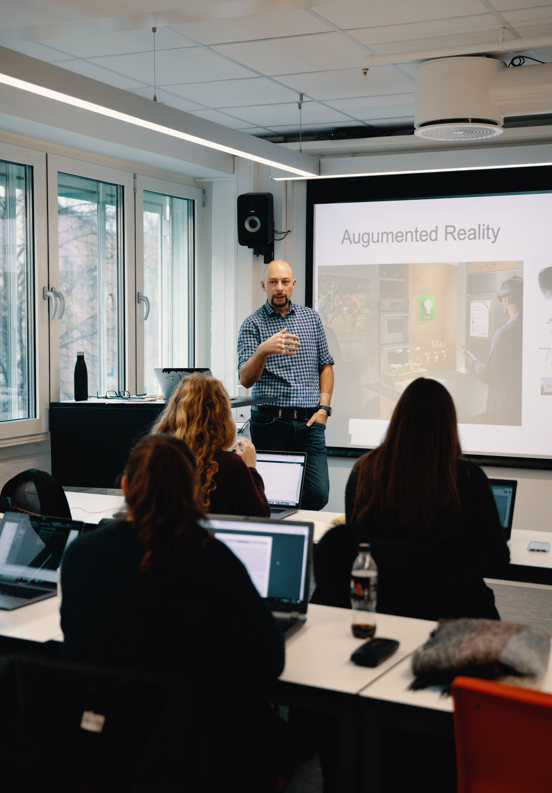
Data Science
This programme is for those who are passionate about the IT discipline and who want a career within an exciting field in growthAdmissions closed autumn 2026

Key information
Motivating environment
The study program consists of small classes and lecturers who makes sure that all students are cared for, seen and heard.Exchange program
You can apply to our exchange program and travel to Finland, South Korea, Germany amongst others.
- Bachelor
- Fall 2025
- Full-time
- 180 Points
- Oslo
- 3 years
- English
Learning Outcomes
- Information Risk and Security
- Machine Learning
- Big Data and Cloud Computing
- Research Methods
- Predictive Analytics
Following the completion of the course, you will have the tools needed in order to begin an exciting career within an industry in rapid growth. You will also have several options at the master's level, including the Master’s degrees in Information Technology at Kristiania University of Applied Sciences.

Study model
- PGR210Machine Learning and Natural Language Processing
The course provides knowledge of the key concepts, techniques and methods related to machine learning. Topics include an understanding of the mathematical basics of data mining and machine learning, linear models for regression such as maximum likelihood, sequential learning, regularized least squares and classification models such as probabilistic generative models, probabilistic discriminative models. Furthermore, the course provides the students with practical hands-on experience on machine learning using open source machine learning libraries such as scikit-learn in Python programming language. The course also provides knowledge of the key concepts, techniques and methods in natural language processing to text analytics. The students gain in-depth knowledge of natural language processing and will further apply this to practical scenarios with acquired skills in text classification methods. The course provides students with hands-on experience on text analytics using open source machine learning libraries such as scikit-learn, Natural Language Toolkit (NLTK) in Python programming language. After completing the course, the students will be able to apply and use appropriate machine learning techniques in various data science domains.
- PGR211Advanced Programming for Data Science
The course will discuss different programming approaches in the Python programming language, especially, Object-oriented features vs functional programming practices and web programming techniques. The course will focus on when it is appropriate to use each of these features/approaches to address problems, not only limited to data science problems but also to understand Python's capabilities as a general-purpose programming language. The course will cover topics related to Object-oriented features of Python, Functional programming practices such as higher-order functions and anonymous functions, and web programming using some of the popular web frameworks in Python.
- PGR206Data Structures and Algorithms
The course will provide insight into algorithms and data structures that are central to the work of implementing and designing effective computer systems. Emphasis is placed on asymptotic analysis of worst-case scenarios, as well as central algorithms and data structures related to search and sorting. The course also deals with graph algorithms, optimization algorithms and data-compression algorithms.
- VALUTV99930MElective courses or exchange studies
- PGR207Deep Learning
The course provides knowledge of the key concepts, techniques and methods related to artificial neural networks; deep learning. The students gains in depth knowledge of mathematical foundations of deep learning, neural networks and gains advanced skills in applying the appropriate tools, techniques and development of the respective areas. Furthermore, the course provides the students with practical hands-on experience on deep learning using open source deep learning libraries in the Python programming language. After completing the course, the students will be able to apply and use appropriate deep learning techniques within various data science domains.
- PGR304Predictive Analytics
The course provides knowledge of the key concepts, techniques and methods in predictive analytics. This course will cover methods and tools for data pre-processing for forecasting tasks in data science, techniques for selecting well-suited models for analysis, model performance evaluation tools. The course provides students with hands-on experience on predictive analytics using open source statistics tools. After completing the course, students will be able to apply and use various predictive analytics techniques such as regression, time series on numerical datasets.
- PG3302Software Design
Emnet skal gjøre studentene i stand til å designe og videreutvikle større programvaresystemer i tråd med kjente teknikker for modellering, testing og implementasjon.
- PGR307Agile Project
The purpose of the course is to give the student an experience in mastering the whole of a project, with emphasis on applying a flexible method: Scrum. Scrum is a flexible process framework for developing innovative products and services, especially suitable for software development.
Through a process for developing a technical solution, the student will plan and implement a comprehensive project case for a company in a multidisciplinary group, and will receive training in using modern agile techniques and tools along the way.
- PGR306Research Methods
The course aims to introduce research strategies and methods, which are especially relevant for the information technology sector. Research is a cyclical process where approaches are carefully adjusted and refined over time.
The aim of this course is to provide students with a fundamental understanding of research as a conceptual, empirical and practical approach to gathering new insight and knowledge within infomation technology. Teaching centres on applied research from the fields of information systems, data science and computer science and presents students with relevant methods from this domain, along with their possibilities and limitations.
The course supports the bachelor's degree project, primarily in relation to developing a research strategy, applying appropriate methods for data collection and reporting.
- BAO304Bachelorprosjekt
I dette emnet får studentene yrkeserfaring ved å gjennomføre et IT-prosjekt i en bedrift. Studentene skal demonstrere bred kunnskap om sentrale temaer og teorier, samt vise ferdigheter i metode, bruk av verktøy og teknologier innenfor fagområdet. Prosjektet gjennomføres i grupper og resultatet av arbeidet dokumenteres i en prosjektrapport. Prosjektleveransen defineres og utvikles i samråd med bedriften, samt at studentene følges opp av en intern veileder ved skolen. Dette emnet bygger også på tidligere emner i bachelorløpet, i form av blant annet kunnskap om utviklingsmetoder, risikohåndtering, prosjektarbeid og prosjektstyring. Utover dette må også studentene regne med å sette seg inn i ny kunnskap relatert til prosjektet de skal gjennomføre. Det kan være knyttet til bruk av programmeringsspråk, metode eller programvare. Emnet har en sterk arbeidslivsrelevans og studentene får reell og nyttig arbeidserfaring i løpet av prosjektperioden.
Career Opportunities
Examples of positions you will qualify for include:
- IT Consultant
- Data Scientist
- Programmer
- Solution Specialist
- Business Developer
- Project Manager
- Big Data Specialist
This is just a selection of the possibilities that will be available to candidates who are passionate about the discipline and who want to build a career within an exciting industry.
Meet the faculty

How we work
Our research emphasizes economics, innovation, digitization and IT. In addition, there are several exciting research projects in applied informatics, information systems and human-computer interaction. Our lecturers have extensive experience both within industry and academia. Relevant working life experience is brought into the teaching through lecturing and guest lecturing. This will make you used to working life challenges and will ease the transition between study life and work life.Moreover, we collaborate with Gründergarasjen (Oslo’s incubator for technology-intensive early-stage startups) and Loftet Studentinkubator (Kristiania’s own incubator for students who have a business idea or a startup).
Campus Life
Kristiania is a place for everyone, whilst being a place where you will study along with others who share your passions. An education from Kristiania is practice-oriented, which makes our students sought-after in the labour market, even before they have finished their education. The students' own line associations make for opportunities to meet and bond on the basis of shared interests, while the incubators like Loftet and Bryggeriet creates a bustling and inspiring environment for the students' own companies.
This is the application process
Important deadlines
The application deadline is April 15. The deadline for submitting diplomas and certificates is July 1.Read moreHow to apply
Min Side for søkere is where you accept the offer and upload necessary documentation for your qualifications.Read moreProcessing time
For study programs with rolling admissions, you will receive a conditional offer within 1–3 days of submitting the application, if there are available slots for the study program you applied for.Read more
Semester registration
You must register and confirm your individual education plan before you are reported as an active student to the Norwegian State Educational Loan Fund, and to gain access to your subjects in Canvas, the learning platform.Read moreSiO (Oslo) and Sammen (Bergen)
SiO and Sammen offers housing, health services, kindergardens, fitness centers and much more to its members.Read moreLoans and grants
All our study programs are publicly approved and give the right to apply for loans and grants from the Norwegian State Educational Loan Fund (Lånekassen).Read more
Services and adaptations
As a student, you can get guidance, everyday adaptation and follow-up on study-related questions and challenges. We have a duty of confidentiality.Read moreMitt Kristiania
This is where you get an overview of your schedule, syllabus, services and other tools you need as a student.Mitt KristianiaStudent ID card
As a new student, you can have a student card made on all our campuses except the Brenneriveien Campus. Your student card serves as an access card at the college’s campuses, ID for exams, payment card for printers and library card.Read more
Do you have questions?
